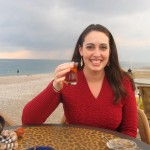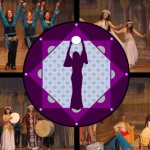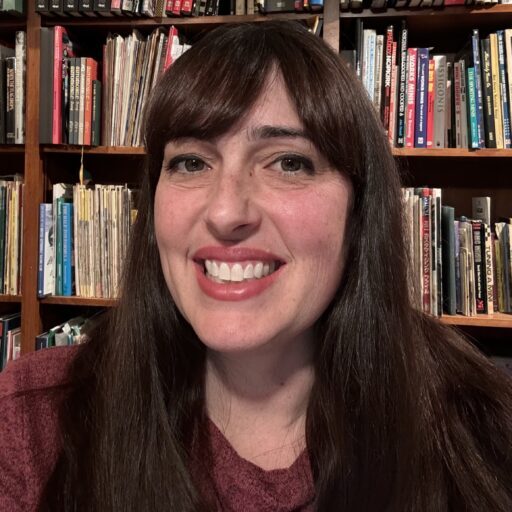
Am I Turkish? Am I Ukrainian? Am I Jewish? Am I Muslim? Am I Christian? Am I American? My cultural identity is a bit confusing.
My mother was born and raised in Istanbul, Turkey and immigrated to the United States to attend college. Her family sent her to stay with her aunt in Las Vegas, Nevada to ensure she obtained a good American education at the University of Nevada at Las Vegas. At school she met my father, an American man whose Jewish great grand parents emigrated from Kiev, Ukraine. After 13 years of marriage, my parents divorced, remarried and started new families. My mother introduced me to my future stepfather when I was 12. Although he was also a multi-generation American, his family was Norwegian/Irish Christian Baptists.
I grew up in a household that was definitely multicultural. Not only did I celebrate Turkish/Muslim holidays like Şeker Bayramı and Kurban Bayramı, I received Hanukkah gifts under the Christmas tree for most of my early childhood.
Being exposed to many different cultures and religions during my youth provides me with a unique perspective on multiculturalism, and what I believe is the essence of being an American. The “melting pot” turned “salad bowl” analogies resonate with me strongly. Envisioning a melting pot demonstrates a loss of one’s original culture and yields a completely new one. The salad bowl, on the other hand, infers that your original culture is successfully maintained while creating a heterogeneous mixture with the others. In my opinion, both scenarios apply when you are either indigenous or an immigrant in America, and each generation has a unique experience.
Although I have a diverse genetic and adoptive culture through my paternal ancestors, I was most influenced by my Turkish mother. My personal challenge is attempting to hold on to my Turkish culture and not allow it to completely melt in the pot. And, if a cucumber represents being Turkish in America’s salad bowl, I’m turning it into a pickle and telling everyone about it (by the way, I highly recommend Turkish pickles called turşu).

Mastering “Turk-lish” as I translated between my English-speaking dads and my anneanne (maternal grandmother), fusing traditional Black Sea folkloric techniques with modern jazz dance, and not knowing that there is a big difference between using sen (“you” used in informal settings) versus siz (“you” used in formal settings) when I met the President of Turkey, are just a few examples of my earlier experience making pickles.
I am proud to identify myself as a Turkish-American, and I am fortunate to be exposed to other cultures, including my Jewish heritage (which I have recently begun to explore). Although I don’t feel “Turkish enough” among Turks and “American enough” among Americans, I have created a new space for my identity and attempt to bring my cultures together as often as possible, and in as many social and physical spaces as possible.
Shaping the built environment, mentoring women leaders, and learning about my own heritage and other cultures in the community, collectively have become my passion. In 2004, I was a founder of the Orange County Turkish American Association and subsequently served as the Chairman of the Board for three years. In addition to providing cultural programming for Turkish Americans in Orange County, we also dedicated our time to education and outreach in the community. Participating in events such as the Irvine Global Village Festival, screening Turkish films for the Irvine Multicultural Association, and performing Middle Eastern dance and music has exposed me to a rich multicultural community in Orange County.
Unfortunately, space is always a challenge. Multicultural activities are usually initiated by the non-profit community and spaces need to be affordable and accessible. In response to this need, I became involved in is a grass-roots community organization called the Orange County Multicultural Coalition. This group consists of multicultural organizations and individuals dedicated to supporting the development of a Multicultural Center at the future Orange County Great Park. This master planned metropolitan park encompasses approximately 1,300 acres at the former Marine Corps Air Station El Toro in Irvine, California.
Sustainability is the cornerstone of this future public space and it includes a variety of elements from a sports park to a wildlife corridor that offer social, recreational, and ecological conservation opportunities to the community. Planners often focus on the environmental and economic elements of the sustainability definition, but how can we enhance the social equity component? As a member of the multicultural community and as a planner by profession, I view the Orange County Great Park as a unique opportunity to highlight social equity in the context of a sustainable, physical space. Whether this space becomes one building, a series of buildings, structures, and/or gardens, developing a Multicultural Center could represent social equity efforts in the context of sustainability.
Sustainability’s “social equity” is hard to define. Personally, I view it as a mechanism to improve quality of life by enhancing and highlighting social capital such as community organizations, multiculturalism, interfaith organizations, languages, education, and civic engagement. The Multicultural Center could capture these elements. It could encourage equal access to these opportunities to address common needs in the community and consider diverse interests in a fair manner. “Could” is the operative word, and we need to continue encouraging its development and other spaces like it in our communities.
This brings me back to pickles. Whether you think about our community as a melting pot, salad bowl, or something else entirely, you have a role here. Your work as a planner, parent, interfaith supporter, friend, entrepreneur, world traveler, and/or legislator, can contribute to a more sustainable community, especially if you focus on augmenting your social capital.
Making pickles is not easy. They take time and energy to make, they look and taste very different from a cucumber, and not everyone likes them in salad. But, I think pickles make our community salad delicious and pull together the ingredients by highlighting their differences.
Go ahead; make your own pickle and add it to your community salad. I bet someone will enjoy it.
<Article Published in Orange County American Planning Association Spring 2008 Newsletter & Winner of Diversity Award>
